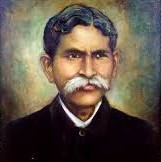Swabhaba Kabi Gangadhar Meher
Died :- 04-Apr-1924
Place of Birth :- Barapali, Baragad

Swabhaba kabi Gangadhara Meher was one of the most renowned Odia poets of the 19th century. Though poor in wealth and education, he remained one of the most prolific and original contributors to Odia literature, embellishing his poetry with lively description of Nature. It has earned him the title Swabhab Kabi or Poet of Nature.
Gangadhara was born on 9 August, 1862, Shravana Purnima, at Barpali of present-day Bargarh district of Odisha. His father, Chaitanya Meher, was working as a village Vaidya (Rural ayurvedic doctor) besides his family profession of weaving. But as he could not maintain his family with the income, he opened a village school and began to teach a few children. Gangadhara Meher could read up to the Middle Vernacular Standard, (Class Five) amidst adverse situations, and his keen eagerness for literature eventually sparked his skills in writing poems.
As a young boy, Gangadhara heard the Jagamohana Ramayana written by Balarama Dasa and afterwards he himself read it. He also read the Odia Mahabharata by Sarala Dasa. He also read and mastered a great number of Sanskrit books of which ‘Raghu-vamsham’, deserve mention. Tulasi Ramayana in Awadhi used to be held by him in great respect. He used to read Bengali magazines and newspapers.
Gangadhara got married at the age of 10. As his father’s pecuniary condition was not satisfactory, Gangadhar used to go to school in the morning and help his father in weaving in the afternoon. His clear and beautiful hand writing also drew attention of many people willing to get their letters and applications scribed by him. The condition of the family improved a bit due to his hard labour when, to the misfortune of the family, the ancestral house caught fire.
The then Zamindar of Barpali, Lal Nruparaj Singh, offered him the post of an Amin (Patwari). Coming to learn about the amicable behaviour and virtues of Gangadhara, the Zamindar promoted him to the post of a Moharir. He continued to serve in the said post and was transferred to Sambalpur, Bijepur and Padmapur, and at last transferred to his own native place Barapali on a salary of Rs. 30/- per month.
The poet was very liberal and progressive. During the last part of his life, he organised an All Odisha Social Conference of Mehers with a view to uplifting the weavers’ society. Nearly three thousand Mehers from different parts of Odisha assembled at the conference. The poet put up twelve proposals for reforms of the society and all were passed unanimously.
Gangadhara started composing poems from a very tender age. His first writings followed the style and technique of the ancient Odia writers. His first work was ‘Rasa-Ratnakara’, a romantic epic. Then, persuaded by friends, he changed his ways and wrote poems and epics in the modern Odia style. Kabibara Radhanatha Ray praised his works very much.
His prominent works include Tapaswini, Pranaya Ballari, Kichaka Badha, Indumati, Rasa-Ratnakara, Balarama-deba, Ayodhya Drusya and Padmini. He has also written innumerable poems many of which reflect his nationalist sentiment and love for mother tongue.
The works produced by Gangadhara Meher are marked by vivid imagination, in beauty and clarity of language, in the novelty of style, in point of forceful character painting and in the lively description of Nature from different perspectives. His writings remain as some of the greatest creations in Odia literature. A research conducted at the North Orissa University reveals many similarities between Gangadhara Meher and western romantic poets like P.B Shelley, Lord Byron and John Keats. The treatment of Nature is equally the same in their poetries.
In 1949, Sambalpur College established in 1944 was renamed Gangadhar Meher College in his honour. Later, in 2015, it was upgraded to a university, now known as Gangadhar Meher University. Sambalpur University, Burla, has instituted the Gangadhar Meher National Award for Poetry which is conferred annually on its foundation day.
Books
Poems
Poem
Autobiography
Biography
Criticism
Non-Fictional Writing
Story
Short Story
Philology
Short Stories Collection
Copyright © 2024 Odia Virtual Academy. All rights reserved Total Visitors- 1
Powered by: Odia Virtual Academy

